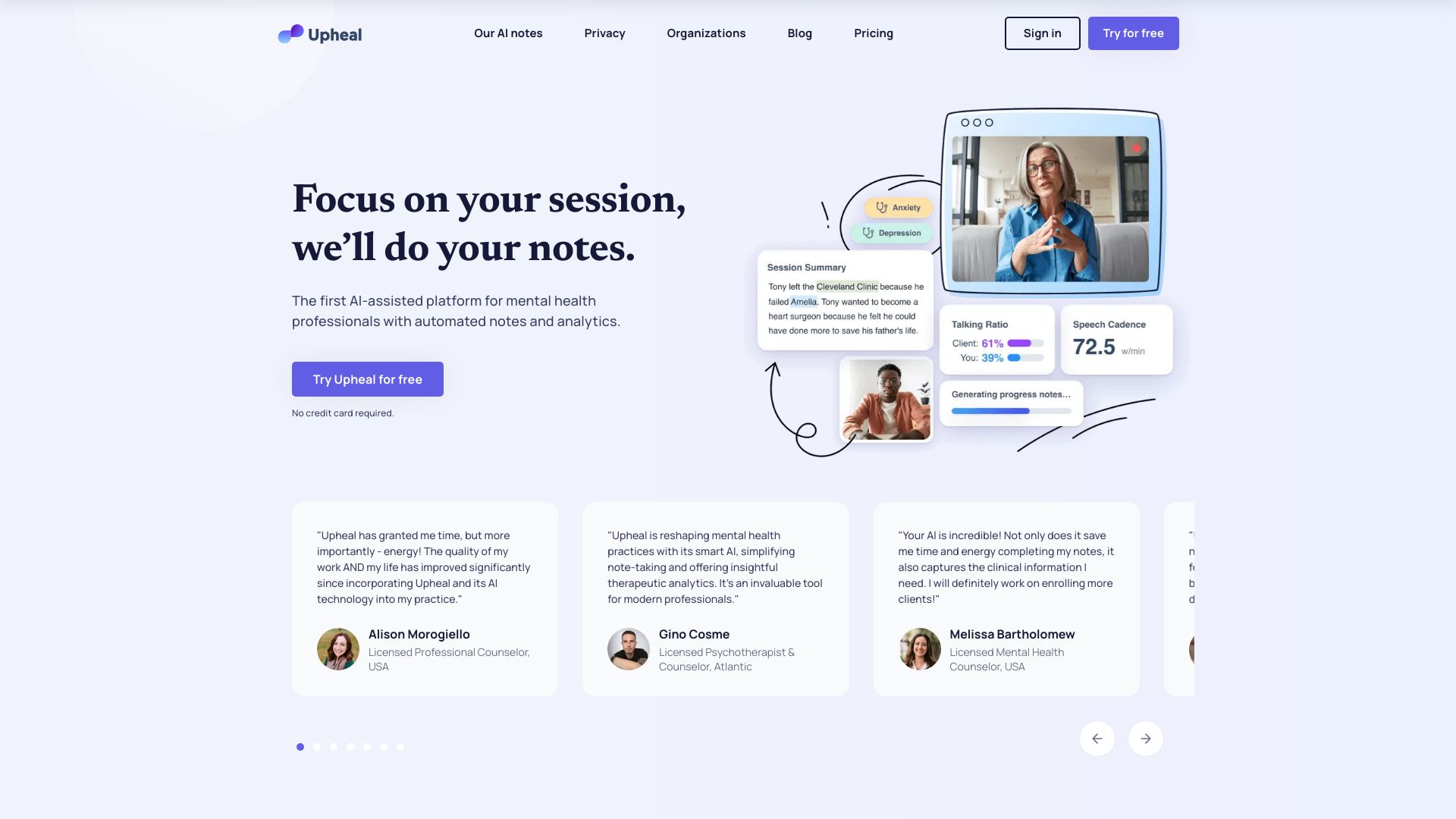- Home
- AI Healthcare
- Upheal

Upheal
Open Website-
Tool Introduction:AI therapy notes, plans, and session analytics for clinicians.
-
Inclusion Date:Oct 28, 2025
-
Social Media & Email:
Tool Information
What is Upheal AI
Upheal AI is an AI-powered progress notes and analytics platform built for mental health professionals. It captures and structures therapy sessions so clinicians can stay present while documentation happens in the background. Using speech-to-text and clinically aware models, it drafts progress notes, summaries, and treatment plans aligned with formats like SOAP and DAP. Session analytics surface themes, goals, and potential risk cues to support quality care and supervision. With privacy safeguards and flexible export options, Upheal reduces admin time and helps maintain consistent, high-quality clinical records.
Upheal AI Key Features
- Automated clinical notes: Generates draft progress notes, intake summaries, and session summaries in SOAP/DAP or custom templates to fit your documentation standards.
- Treatment planning: Suggests goals, objectives, and interventions you can refine to align with client needs and modalities.
- Session capture and transcription: Consent-driven recording with accurate transcription and time-stamped highlights to revisit key moments.
- Session analytics: Insights on topics, client/therapist talk ratios, sentiment trends, and progress over time to inform care and supervision.
- Customizable workflows: Edit, approve, and lock notes; tailor templates, prompts, and terminology to your practice or organization.
- Security and compliance: Designed to support HIPAA/GDPR-aligned operations with encryption and role-based access controls.
- Export and interoperability: Export notes as text or PDF, copy structured sections, and use flexible workflows alongside your EHR.
- Team and supervision: Features that support group practices and training programs with consistent documentation and review.
Upheal AI Suitable Users
Upheal AI suits solo therapists, group practices, and behavioral health clinics seeking faster, more consistent documentation. It also supports clinical supervisors, training programs, and outcome-focused teams that benefit from AI progress notes, treatment plans, and session analytics. Researchers and quality leaders can use aggregated insights to monitor trends while protecting client privacy.
Upheal AI How to Use
- Create an account and configure privacy, consent, and note templates according to your clinical and regulatory requirements.
- Add a client profile and select preferred documentation format (e.g., SOAP, DAP) and any treatment planning frameworks.
- Capture the session with informed consent, using transcription-enabled recording to generate accurate text.
- Review the AI-generated draft notes, refine language, add clinical judgment, and confirm risk assessments as needed.
- Generate or update the treatment plan with goals, objectives, and interventions aligned to your modality.
- Finalize and export notes to your records or EHR workflow; lock and archive according to your policies.
- Use analytics dashboards to track themes and progress across sessions and support supervision or case reviews.
Upheal AI Industry Use Cases
A private practice therapist reduces documentation time after each session by generating SOAP notes and refining them in minutes. A community mental health clinic uses session analytics to monitor goal progression across caseloads and support evidence-informed supervision. A graduate training program employs de-identified recordings and AI summaries to teach note-writing standards and reflective practice.
Upheal AI Pricing
Upheal’s current plans, including any free trials or discounts for teams, are listed on its official website. Review the latest pricing details and terms to choose between individual and organizational subscriptions.
Upheal AI Pros and Cons
Pros:
- Significantly reduces time spent on therapy progress notes and summaries.
- Produces consistent, clinically structured documentation (SOAP/DAP) with customizable templates.
- Session analytics offer actionable insights for care quality and supervision.
- Privacy-focused design to support HIPAA/GDPR-aligned workflows.
- Flexible exports that fit varied EHR and record-keeping workflows.
Cons:
- Requires thorough clinician review to ensure clinical accuracy and nuance.
- High-quality audio, stable connections, and client consent are essential.
- Learning curve to tailor templates and prompts for best results.
- Subscription costs may be challenging for very small practices.
- Direct integrations with certain EHRs may be limited or require manual export.
Upheal AI FAQs
-
Is Upheal AI HIPAA-compliant?
Upheal is designed to support HIPAA-aligned operations with security controls and a compliance-focused workflow. Confirm compliance details and agreement terms (e.g., BAA) directly with the provider.
-
Can it generate SOAP or DAP notes?
Yes. Upheal can draft notes in SOAP/DAP formats and lets you customize templates to match your documentation standards.
-
Does it replace clinical judgment?
No. The AI provides draft documentation and insights, but clinicians must review, edit, and make final decisions.
-
Do I need to record video to use it?
No. Transcription-based workflows focus on audio and text. You control what is captured and stored based on consent and policy.
-
Will it work with my EHR?
Upheal supports exports (e.g., text, PDF) to fit most EHR workflows. Check the website for the latest information on any direct integrations.
-
How does session analytics help therapy?
Analytics can highlight patterns, goals, and talk-time balance across sessions, supporting progress tracking, supervision, and care planning.




